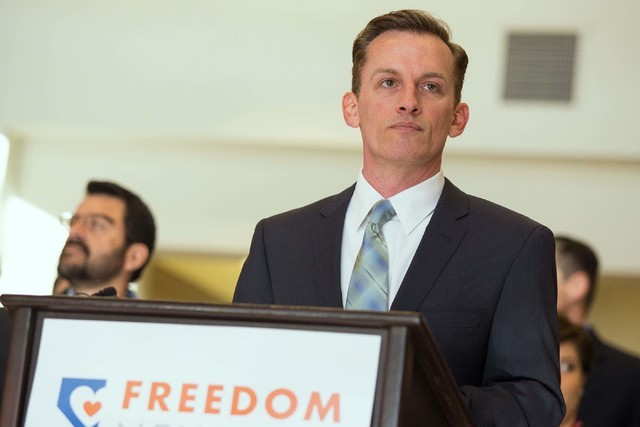ACLU of Nevada helped shape the Silver State over the past half-century

Imagining a Nevada without the influence of the American Civil Liberties Union calls to mind a very different state.
Fifty years ago — the same year Caesars Palace opened, in fact — the ACLU of Nevada was born in Reno, the brainchild of some college professors and attorneys who decided to take a stand for the rights of minority residents during the heyday of the civil-rights movement.
Since then, the group has been involved in nearly every issue in Nevada that involves the Bill of Rights, from personal privacy to free speech to the rights of prisoners and lesbian, gay, bisexual and transgender people.
“Nevada would not be the Nevada that it is today without the ACLU,” said Tod Story, the group’s executive director. “It’s not perfect, but it’s a lot better than it could have been.”
For example, it was the ACLU of Nevada that stood up to fight for union protesters and other picketers who casino owners wanted to throw off various sidewalks along the Strip. The group fought several ill-considered ordinances passed by the Clark County Commission that would have restricted free speech, and won several victories.
Downtown, the ACLU of Nevada successfully fought for the same rights for people on the Fremont Street Experience.
The ACLU of Nevada sued over the medical treatment that inmates receive in state prisons, leading to much-needed reforms and improving the health care behind bars.
Nevadans will decide this year whether to legalize recreational marijuana, but the ACLU of Nevada first broached the issue as far back as 1976 by co-sponsoring a UNLV seminar on decriminalization. It would be another 22 years before Nevada voters finally began the process of legalizing medical pot.
The ACLU of Nevada was instrumental in the creation of the Citizen Review Board, which monitored use-of-force incidents by local police. It fought two attempts to create a law modeled on the federal Religious Freedom Restoration Act in Nevada. And it challenged a ballot initiative on immigration that would have mirrored Arizona’s controversial SB 1070. (The initiative was later withdrawn.)
“Unfortunately, some of the same battles continue to be fought,” Story said.
Looking ahead, Story said the ACLU will continue its longtime advocacy on behalf of gay, lesbian, bisexual and transgender people, including opposing bills similar to one passed in North Carolina that ban transgender people from using the bathroom of their choice. And, he said, the group will continue to fight to overturn the law that creates Education Savings Accounts, which allow parents to use state education dollars on anything from tutoring to tuition at private or religious schools.
The ACLU of Nevada will celebrate its 50th anniversary at its annual gala on Saturday, held this year at the Wynn Las Vegas. It will honor several community members and feature remarks by activist and TV personality W. Kamau Bell, star of the CNN series “United Shades of America.”
The group will honor Caesars Entertainment executive and former Mayor Jan Jones Blackhurst (with the Community Equality Award), recently retired 8NewsNow anchor Paula Francis (the First Amendment Freedom of the Press Award), attorney Colin Seale (the Community Juvenile Justice Award), former state Sen. Sheila Leslie (the Liberty in Government Award), and founding ACLU of Nevada board member Richard Siegel (the Emily Wanderer Award).
Siegel and his fellow ACLU of Nevada founders may never have envisioned the Nevada of today back in 1966’s Reno, but there’s no question he and the group he founded have had a significant hand in how the Silver State evolved over that time.
Steve Sebelius is a Review-Journal political columnist and co-host of “PoliticsNOW,” airing at 5:30 p.m. Sundays on 8NewsNow. Follow him on Twitter (@SteveSebelius) or reach him at 702-387-5276 or SSebelius@reviewjournal.com.